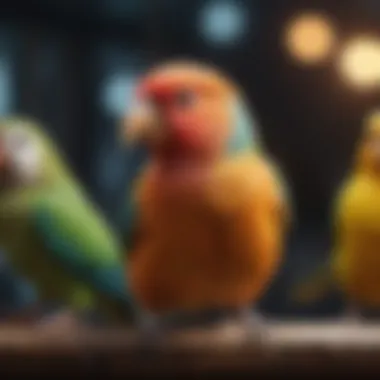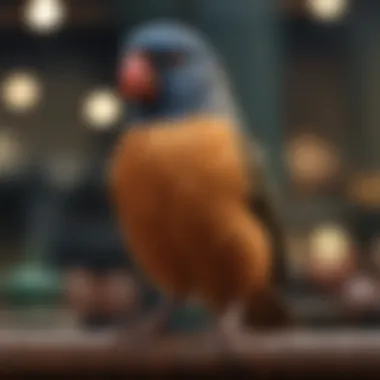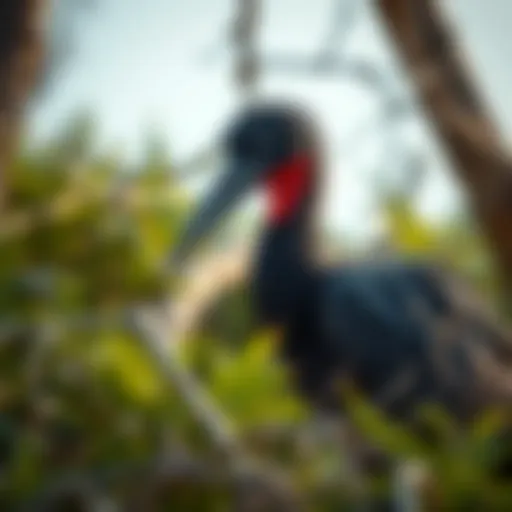Navigating the Online Birds Sale Market: A Guide for Enthusiasts


Intro
The online market for buying birds has transformed drastically in recent years. As more people turn to the internet for pet acquisition, it is critical to understand how this affects the processes involved in purchasing these unique pets. While convenience plays a key role, possessing knowledge about bird care, ethical sourcing, and specific species requirements is essential. Lack of understanding could result in choices that impact both the buyer and the bird involved. Therefore, this article serves as a comprehensive guide to help prospective bird owners navigate the online bird sale market respectfully and responsibly.
Avian Care Basics
To make informed decisions about acquiring a pet bird, future owners must grasp the fundamentals of avian care. This section outlines critical aspects that anyone considering a bird should learn about.
Importance of Proper Nutrition
Proper nutrition is vital for a bird’s health. Different species have specific dietary needs. For example, parrots may require a diet rich in fruits and vegetables, while finches often thrive on seed mixes.
- Offer a variety of foods like seeds, pellets, and fresh fruits.
- Research the dietary needs of the specific bird species one is interested in.
- Regularly provide clean, fresh water.
Understanding Bird Species and Their Needs
Recognizing various bird species, their behaviors, and individual needs helps in maintaining excellent care. Some birds may require more social interaction while others are independent.
- Parrots are social; they enjoy spending time with their owners.
- Canaries are typically more solitary, preferring their own space.
- Assess the traits and personality of a breed before making a choice.
Basics of Birds Habitat Setup
Creating a suitable environment for a bird is paramount for its comfort and well-being. This involves more than just a cage.
- Ensure the cage is the right size to permit movement.
- Include perches, toys, and safe items for entertainment.
- Consider natural elements like climbing areas or platforms.
Grooming and Hygiene Tips
Regular grooming is crucial for keeping a bird healthy. This includes beak trimming, nail clipping, and feather care.
- Bathe birds often according to their preferences.
- Monitor their feathers for signs of dust build-up or parasites.
- Professional grooming may be necessary for some species.
Interacting with Your Pet Bird
Once a bird is acquired, building a connection with it forms the foundation for a positive relationship.
Building Trust and Connection
Establishing trust is progressive. Speak softly and calmly around the bird. Avoid stressed environments to encourage bonding.
Training Techniques and Tips
Training is beneficial both for behavior management and mental stimulation. Basic commands can be taught using reward systems, reinforcing desired behavior through treats.
Fun Activities for Bird Owners and Their Birds
Activity plays an integral role in the well-being of birds. Engaging them with toys or creating home-made challenges enriches their lives.
Recognizing Bird Cues and Behaviors
Observing your bird is essential for being a responsible owner. Pay attention to it and look for behavioral changes as they might indicate discomfort or stress.
Emotional Well-Being of Birds
Health goes beyond physical care. Emotional needs must also be addressed.
The Role of Play and Socialization
Play is key for mental stimulation. Birds require time outside their cage where they can engage in activities freely and socialize.
Enhancing Birds' Emotional Health
Birds, like humans, experience emotions. Gentle interaction along with constant assurance fosters a stable emotional state. A variety of toys can also mitigate stress.
Assessing Bird Stress and Remedies
Stress indicators include excessive vocalization or plucking feathers. Identify triggers and take verbal cues from their behavior.
- Provide safe spaces for your bird.
- Consult an avian vet if stress persists.
Building Strong Human-Bird Bonds
Encouraging a strong bond with the pet often enhances well-being. Be consistent with routines and show keen interest in engaging with the bird.
Bird Health and Safety
Monitoring a bird’s health profiles a responsible ownership stance. Awareness of common issues or environmental hazards is vital.


Common Health Issues and Prevention
Knowledge of typical health problems does not just benefit the bird, it leads to a more harmonious coexistence. Regular health check-ups with an avian vet ensures lasting health.
Routine Veterinary Care
Vaccinations and routine check-ups can identify health concerns early. Linking to professional avian care ensures preventive measures.
Environmental Hazards to Avoid
Keep harmful substances out of reach. Procure bird-safe cleaning products and electronics that might pose risks to curious beings.
Signs of Illness or Distress
Look for subtle cues that may signal changes in your bird's well-being. Symptoms such as lethargy, lack of appetite, or changes in droppings can denote health issues that warrant professional assessment.
Fun Facts and Quirky Insights
Learning more about birds can make ownership more fulfilling. Recognizing the unique traits of species can be enlightening and fun.
Unique Traits of Popular Bird Species
Each species holds unique attributes. African grey parrots are known for their vast vocabulary, while cockatiels are admired for their whistles.
Historical and Cultural Significance of Birds
Birds have held symbolic meanings across diverse cultures for centuries. Studying this richness adds depth to bird ownership.
Famous Bird Owners and Their Stories
Throughout history, notable figures have keenly embraced birds as companions. Exploring their affinity with avians presents an intriguing perspective on bird-keeping.
A thorough observation of needs and dedicated care enhances both owner and bird experience.
Understanding the Online Birds Sale Market
The online birds sale market has gained prominence in recent years. Understanding this topic is essential for various stakeholders, particularly for pet bird owners, aspiring bird parents, and breeders. With the rise of e-commerce, buying birds online has become a viable alternative to traditional pet stores. This shift not only offers convenience but also expands the options available for potential bird owners. As enthusiasts seek diverse species and specialized breeds, navigating this online landscape becomes critical.
An important aspect to consider is market trends. Changes in consumer preferences, driven mainly by convenience and the quest for specific breeds, influence how birds are marketed and sold. Understanding these trends facilitates informed decisions regarding purchases, ensuring that buyers can find healthy, ethically sourced birds from reliable sellers.
In addition to trends, the e-commerce growth in pet bird sales deserves attention. This change has opened a multitude of platforms, enabling breeders and sellers from different regions to reach potential buyers. Examining how this shift enhances accessibility highlights the potential good it brings to prospective bird owners.
Key benefits of understanding the online birds sale market include:
- Awareness: Knowing what to expect before making a purchase.
- Responsibility: Making choices that promote well-being for the birds.
- Knowledge of trends: Keeping abreast of the latest species and seller behaviors enhances purchasing outcomes.
认识游戏的整个生态系统, 赋予在线看鸟交易的能力.
Current Trends in Online Bird Sales
Several trends are shaping the landscape of online bird sales. The increasing prominence of social media platforms plays a crucial role by creating communities. Enthusiasts exchange information, thus influencing popular species and trends among buyers. For instance, birds like budgies and cockatiels have become favorites due to their engaging interactions and relatively minimal care demands.
Beyond social media, seminars and webinars conducted by avian experts have further educated the market, allowing buyers to have practical knowledge about bird care and selection. This trend underlines the importance of education in making informed purchases. Geographical restrictions are also fading. This access is benefiting both the sellers and buyers — breeders reach a broader audience while buyers find the specific birds they desire regardless of location.
Additionally, specialized websites are taking a significant role, exhibiting extensive information on breeds, care, and first-hand experiences. Such resources help mitigate risks involved in purchasing from ad-hoc sellers. It important urges aspiring bird owners to look into these resources for a better understanding of specifics rather than relying solely on casual advertisements. This relationship dynamic enhances marketplace integrity, ensuring better outcomes for all.
The Growth of E-commerce in Pet Bird Sale
The acceleration of e-commerce has transformed the pet bird sales environment. This platform revolutionizes how buyers seek and select their avian companions. The convenience of browsing diverse selections from home cannot be overstated. Electronic transactions lead to a seamless buying experience from initial inquiries to the final purchase.
However, this growth brings both opportunities and considerations. While pet birds from local stores become less sought after, potential buyers must be cautious about seller reliability. Verifying seller credentials online requires vigilance and due diligence. The proliferation of online platforms may lead to legitimate concerns regarding quality and ethical practices. Therefore, a comprehensive understanding is key for buyers engaging in the online market.
A balanced approach for buying online includes:
- Researching breeders: Thorough monitoring of seller reputations through reviews and ratings.
- Asking the right questions: Inquiring about breeding practices and health guarantees can deliver peace of mind.
- Never settling for less: Findways to seek out the information without getting trapped into direct transactions without relative evidence of care or quality.
Overall, the dynamics of the e-commerce growth creates diverse conditions for prospective bird owners.
Understanding these changing dynamics is not just useful; it is essential for making wise decisions that support both the buyer's desires and the welfare of the birds.
Legal Considerations
Understanding legal considerations is crucial for anyone venturing into the online birds sale market. Not only does it further the interests of responsible bird ownership, but it also protects the legality of one's purchasing choices. This segment aims to illuminate the regulations surrounding bird sales as well as the consequences of non-adherence.
Regulations on Bird Sales
When buying birds, potential owners must navigate a dense bureaucracy dictated by local and international laws. Each country, and often regions within them, may enforce distinct regulations regarding the sale of birds. This framework aims to prevent unfair practices within the market that could adversely affect bird welfare and biodiversity.


Various factors characterize regulations on bird sales:
- Species Restrictions: Certain species like endangered or protected birds may have strict sales prohibitions to conserve animal populations. Prospective buyers need to first confirm the legal status of their desired species in their homeland.
- Breeder Licensing: Many jurisdictions require breeders to have licenses. This entails that they must comply with certain standards of care and ethical practices. Owning birds from licensed breeders quite often ensures the health and genetic lineage of the birds.
- Animal Welfare Laws: Regulations often align closely with animal welfare guidelines, necessitating that vendors uphold careful treatment of the birds they sell. Non-compliance can lead to penalties for both sellers and buyers.
Deviating from these regulations can lead to significant consequences including fines or the loss of one's pets. Thus, understanding local regulations is indispensable for any aspiring bird owner.
Import and Export Restrictions
When exploring ways to acquire birds from outside one's country, prospective buyers must consider the legal barriers often tied to international transactions. Import and export restrictions exist to mitigate various concerns, including the spread of diseases and the pressure on vulnerable ecosystems.
Some critical aspects include:
- Quarantine Requirements: Many nations mandate quarantine periods for birds arriving from abroad to ensure they are not transporting diseases. Understanding these requirements is vital to avoid abrupt disruptions in ownership after a purchase.
- Documentation for Export: To transport a bird internationally, accurate invoice and health documentation is usually mandatory. Sellers must provide clear records proving that birds are suitable for international sale and that all requirements are machinically met.
- Compatibility with Local Laws: Birds imported must comply with both the country of origin and home country laws. Without aligning estas laws, pets can be confiscated or condemned to euthanasia even after the ownership change has taken place. That creates relevance for potential buyers to thoroughly research not just local regulation but those in the source country.
Regulatory compliance is more than just a legal formality; it's a commitment to biodiversity and animal ethics.
Conclusively, navigating the legal landscape is a prerequisite for any potential bird owner. Recognizing regulations on bird sales and the complexities involved in import/export limits establish a foundation for upholding bird welfare. Remaining informed contributes significantly to the animal's well-being and fidelity towards responsible ownership.
Ethical Sourcing
Ethical sourcing is a critical component in understanding the online birds sale market. As interest in avian companionship grows, so does the responsibility that potential buyers carry. Engaging in ethical sourcing means prioritizing the well-being of birds by emphasizing responsible breeding and transparent sales practices.
Initial awareness of what constitutes ethical sourcing can shape customer behavior significantly. This means seeking sellers who adhere to industry standards that promote care for the bird species being sold. Ethical behaviors ensure that birds are treated with respect throughout their lives, from breeding through to sale.
Importance of Responsible Breeding
Responsible breeding plays a vital role in ethical sourcing. This practice guarantees that birds are bred in healthy environments that prioritize genetic integrity and behavioral health. Breeders should provide proper conditions that mirror the natural habitats of these birds, offering enrichment and socialization essential for their development.
Purchasing from responsible breeders serves multiple benefits:
- Healthy offspring: When breeders prioritize health, the chances of buying a bird with genetic disorders reduced significantly.
- Socialization skills: Birds bred in lively environments often maintain better social interaction skills when they become pets.
- Long-term support: Good breeders offer guidance and are generally more invested in their birds’ futures, helping new owners adapt.
In contrast, unregulated breeding operations often result in numerous health and behavioral issues for the birds involved.
Recognizing Fictional and Misleading Sales
Navigating the online bird market can expose potential buyers to misinformation. It's crucial to learn how to identify fictional and misleading sales. Transparency in the breeding processes and sales conditions is what buyers should demand.
Common signs of deceptive sales include:
- Absence of detailed health records: A reputable seller should provide legitimate documentation regarding future care and health checks.
- Unusually low prices: Unexpectedly cheap birds may come from less reputable sources, leading to long-term implications.
- Vague sourcing information: If a seller cannot explain where their birds come from or cannot offer substantial backgrounds, caution is advisable.
Considering these signs enables better purchasing decisions. Authentic sellers know the value of their inventory and seek to offer ethical and trust-based selling experiences. Purchase from those who share their breeding process, adhere to animal welfare standards, and respect the birds' nature overall.
"Being an aware consumer not only reflects personal values but also influences the market towards more ethical practices that benefit owl avians in countless ways."
Recognizing these practices enhances not only the buyer's experience but also fosters a more sustainable future for birds in both the online market and society.
Types of Birds Available Online
Understanding the various types of birds available in the online market is crucial for prospective owners. The diversity in species caters to different preferences, space requirements, and expertise levels among bird owners. Each type comes with its own set of characteristics, needs, and potential payoffs for the owner, making informed choices important in ensuring a healthy and happy companion.
Popular Domestic Bird Species
Domestic birds are among the most sought after pets. They are often easier to care for compared to their exotic counterparts. Commonly kept domestic species include:
- Budgerigar (Budgie): Small, colorful, and sociable, budgies are ideal for beginners. They thrive on human interaction and can learn to talk.
- Cockatiel: These birds can be quite affectionate and enjoy being involved in family activities. They are also relatively easy to train.
- Lovebirds: Known for their strong pair bonding, they require more social interaction and mental stimulation. Keeping a pair is often recommended.
- Canary: Beautiful singers, canaries are known for their vibrant colors. They are not as interactive as some other breeds but bringing joy with their songs.
- Finches: Small and often very social in a group, finches require less handling and can give an appealing lively atmosphere in a home.
Selecting a domestic bird often begins with understanding not just physical appearance, but personality traits and care needs to match your lifestyle.
Exotic Birds: Opportunities and Challenges
Exotic bird species offer a different kind of allure, but they come with significant responsibilities. Highlights include:
- Macaws: Large, vibrant birds known for their striking colors. They are intelligent and social, but need space and can live for over 50 years with adequate care.
- Cockatoos: Known for their striking crests and strong personalities. They require constant interaction and mental stimulation, making them more suited for experienced bird owners.
- African Grey Parrots: Regarded as one of the most intelligent birds, they can develop extensive vocabularies. They need mental engagement and can be challenging for uncommitted owners.
- Amazons: Robust and colorful, Amazons are social birds known for playful behaviors. They often require commitment for their vocal nature and strong personalities.
While the unique beauty, charisma, and intelligence of exotic birds attract many, the commitment required for their care is substantial. Potential owners need to seriously evaluate their time, space, and ability to provide what these birds need.
Exotic birds, while visually stunning, often require a larger commitment in terms of time and resources than domestic birds.
Overall, both domestic and exotic birds present unique possibilities and challenges. Assessing your lifestyle against these needs is vital to ensure an enriching experience for both the bird and its owner.
Buying Platforms
Buying platforms are crucial in the online birds sale market. They connect sellers with potential bird owners in an efficient way. Utilities of these platforms can vary greatly. Understanding these differences can help bird enthusiasts make wise decisions.
E-commerce Websites Dedicated to Birds


E-commerce websites that focus on birds offer a range of benefits. Firstly, they usually provide detailed information about various bird species. Quality photos and descriptions help potential buyers understand what they are considering. Some popular e-commerce sites include BirdBreeders.com and BirdsNow.com. Moreover, having a niche website can enhance regulations compliance. Sellers often must adhere to strict guidelines about bird welfare. Therefore, trustworthy websites are beneficial for ensuring responsible sourcing.
When exploring these platforms, buyers can utilize filtering tools like breed, age, and price. A well-structured website allows buyers to find their desired bird quickly.
Additionally, customer reviews on these e-commerce websites are helpful. They can provide insight into how reputable a seller is. A satisfied buyer may share their positive experiences, benefiting new customers. Thus, only sourcing from well-reviewed sellers can reduce risks of improper sales.
This environment promotes transparency and encourages responsible bird sales.
Social Media and Classified Ads
Social media platforms and classified ads can open unique buying opportunities. Buying birds via platforms like Facebook or Reddit can attract both local and distant sellers. Buyers are able to connect with sellers worldwide, often finding rare breeds or less popular bird species.
Instagram can also present visuals that convey information and beauty about specific bird species. Sellers include pertinent details for buyers while leveraging these platforms to attract interest. This is an effective tool for connecting with small breeders who may not have e-commerce sites.
However, with these platforms, buyers must proceed with caution. Presence of less regulation may lead to misleading sales practices. A well-composed ad can conceal red flags. Hence, buyers should verify every aspect of an interaction. Making inquiries about the bird's health and origin becomes imperative.
Overall, while social media and classified ads provide valuable options, buyers must remain skeptical and diligent. Utilizing resources wisely can lead to thorough understanding and eventually, satisfying purchases.
Ensuring Responsible Purchase
When venturing into the online birds sale space, ensuring a responsible purchase is crucial. It is not just about acquiring a bird, but about making informed decisions that will impact its welfare and your experience as a bird owner. Given that the market offers many options, prospective owners must be diligent.
Questions should focus on the seller's credibility, the bird's background, and the overall conditions under which the pet was raised. A successful encounter begins with gathering crucial information, helping eliminate many risks faced during a bird acquisition. Evaluating the seller's proficiency and ethical stance guarantees that you are supporting moral practices and caring environments.
Questions to Ask the Seller
When consulting a seller, adequate information must be pursued to foster a great decision-making process. Here are some essential questions to keep in mind:
- What is the bird’s species and age?
- Can I view photographs of the bird prior to purchase?
- What are the bird’s living conditions?
- Has the bird been socialized or interacted with other pets?
- What kind of diet has the bird been on?
- Has it received any veterinary care or attention?
- Can you provide corroborating references from past buyers?
These inquiry points aim to draw light on the seller's practices enhancing transparency and establishing trust. Verifying the solidness of the seller’s operations helps ensure that you are getting a healthy companion with proper upbringing.
Importance of Verifying Health Status
It is vital to place significant emphasis on the verification of a bird's health status before making a purchase. Many birds, especially those sold online, may carry hidden health issues. Proceeding with the transaction without assurance of health is detrimental for any aspiring pet owner. Payment should only come after solid proof of the bird’s physical conditions, ideally via a recent veterinary report.
Key health aspects to verify include:
- Symptoms of illness: Look for signs such as lethargy, lack of appetite, or unusual behavior.
- Past records: Request any documentation detailing vaccinations or treatments by a vet.
- Previous health checks: Inquire whether the bird had exposure to sick birds or if it has undergone any diseases prevalent in its species.
- Overall health assessment: Always insist upon inspecting the bird you intend to buy before finalizing.
Verifying health status not only protects potential buyers but can also save substantial costs in terms of future medical care.
Prioritizing informed questionings and validating health conditions mitigate risks that undermine bird welfare and owner accountability, ensuring long-term satisfaction.
Bird Welfare and Post-Purchase Considerations
Nurturing a bird after purchase involves a keen awareness of their welfare and overall well-being. It is more than just providing food and water; it requires creating a suitable habitat and establishing health routines. Understanding bird welfare fosters responsible ownership and heightens the quality of life for these delicate creatures.
Creating a Safe Environment
A first step in ensuring bird welfare post-purchase is creating a safe environment. Birds need a comfortable, secure space to thrive. This starts with selecting an appropriate cage. The cage should be spacious enough for the bird to move around freely. Different species require different dimensions based on their size and activity level. The material of the cage also plays a crucial role; it should be non-toxic and easy to clean, avoiding any sharp edges.
Essential components of a bird's safe environment include:
- Bedding: The cage bottom should be covered with safe bedding materials. Avoid toxic options like cedar chips. Instead, use recycled paper or aspen shavings that are gentle on their feet.
- Toys: Providing enrichment through toys is critical for mental health. Rotate them frequently to keep the environment stimulating.
- Perches: Various types and sizes of perches improve foot health. Natural wood perches can help, allowing the bird to grip comfortably.
- Air Quality: Ensure proper ventilation. Birds are sensitive to fumes; avoid smoke or strong odors around their environment. Additionally, natural light is beneficial, but avoid direct sunlight that could overheat them.
Keeping their environment clean with regular maintenance minimizes stress and potential health hazards.
Health Care and Routine Checks
Addressing health needs is essential after purchasing a bird. Regular check-ups and routine care are not optional; they are vital for a robust and fulfilling life. Proper health care contributes to early detection of any issues that might arise. Birds can be secretive when sick, so being attentive is especially important.
Key aspects of bird health care include:
- Veterinarian Visits: Schedule an initial check-up shortly after bringing your bird home. Find a veterinarian specialized in avian care to ensure knowledgeable handling of your pet.
- Diet Management: Provide a well-balanced diet based on the bird species. This might include pellets, fresh fruits, and vegetables. Regularly evaluate and adjust diets with guidance from your vet.
- Weekly Checks: A brief routine inspection could avoid bigger issues. Check for changes in feathers, droppings, and overall demeanor. Any apparent behavioral alterations should prompt a visit to the vet.
- Social Interaction: Engage with birds daily; their mental well-being greatly depends on social contact. Interaction helps resist stress and fosters trust.
Closure
The importance of the conclusion section in this article is to synthesize and encapsulate all the insights gathered throughout the exploration of the online birds sale market. This final segment not only highlights the journey from understanding current trends to addressing ethical sourcing, but also emphasizes the chronicling key considerations for eager bird owners.
In particular, it reflects on the evolving dynamics of the market. As digital platforms expand the reach of bird sales, the nuances around legal regulations and ethical breeding practices become all the more critical. It becomes vital for prospective buyers to discern between responsible sourcing and misleading offers. Recognizing this distinction is crucial in safeguarding both the welfare of the birds and the integrity of the market itself.
The Future of Online Bird Sales
Looking ahead, the future of online bird sales appears both promising and complex. With advancements in e-commerce technology, consumers can expect improved user experiences. Features like real-time health status updates, enhanced filtering options by species or breeder reputation, will likely become standard. Consumer demand for transparency urges sellers to adhere to rigorous vetting processes that ultimately benefit both buyers and birds.
As public awareness and knowledge expand, the expectations for ethical practices will increasingly reflect in buyer decisions.
Moreover, the integration of social media as a platform for sales and community engagement paves way for an expansive exchange of information. Through tailored groups on sites like Facebook and Reddit , bird enthusiasts can share their expertise and insights, fostering a community committed to the well-being of avians.
In summary, the ongoing evolution of the online birds sale market challenges buyers to remain informd and vigilant. It opens a path towards practices that elevate bird welfare and enrich their lives. By grasping these concepts, prospective bird owners can make knowledgeable choices that lead to a fulfilling relationship with their feathered companions.
The future of online bird sales will hinge on the balance between technology and ethical consciousness.















